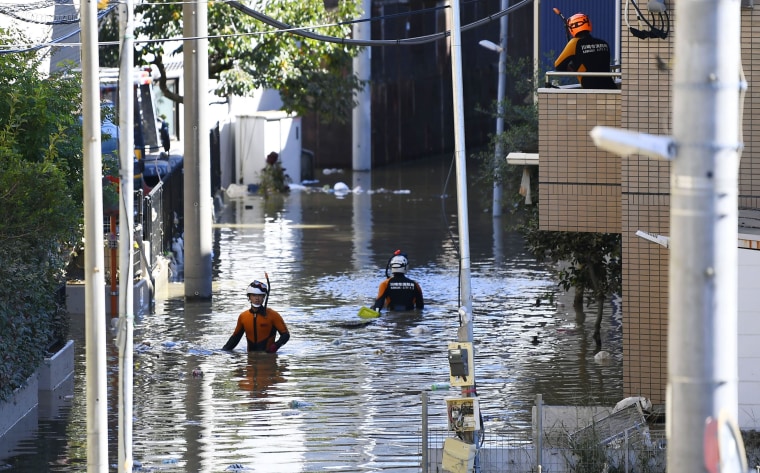TOKYO — Japan sent tens of thousands of troops and rescue workers on Sunday to save stranded residents and fight floods caused by one of the worst typhoons to hit the country in recent history, which killed 23 people and briefly paralyzed Tokyo.
There were also 16 people missing, public broadcaster NHK said, as Typhoon Hagibis left vast swaths of low-lying land in central and eastern Japan inundated and cut power to almost half a million homes.
Landing restrictions at Tokyo's Narita and Haneda airports were lifted but more than 800 flights were canceled for the day, NHK said, as were some Shinkansen bullet train services to the worst-hit areas.
Authorities lifted rain warnings for the Kanto region around Tokyo, where stores reopened and many train lines resumed operations, but they warned there was still the risk of rivers in eastern Japan overflowing and inflicting fresh damage.
Prime Minister Shinzo Abe convened an emergency meeting of relevant ministers and dispatched the minister in charge of disaster management to the worst-hit areas. He offered condolences to the families of those who died and said the government was working to save people's lives and property.
"The government will do everything in its power to cooperate with relevant agencies to restore services as soon as possible," said Abe.
Some 27,000 members of Japan's self-defense forces as well as firefighters, police and coast guard members were sent to rescue stranded people in central Japan's Nagano prefecture and elsewhere, the government said.
NHK said the full extent of the widespread damage was only beginning to emerge because many areas remained under water.
Some 425,000 homes were without power, the government said, reviving fears of a repeat of the weeks-long power outages suffered after another typhoon hit east of Tokyo last month.
In Fukushima, north of the capital, Tokyo Electric Power Co reported irregular readings from sensors monitoring water in its Fukushima Daiichi nuclear plant overnight. The plant was crippled by a 2011 earthquake and tsunami.
NHK showed swaths of low-lying residential areas inundated in parts of central and eastern Japan by overflowing rivers, with some of the worst damage caused by Chikuma river in central Japan's Nagano prefecture.
The storm, which the government said could be the strongest to hit Tokyo since 1958, brought record-breaking rainfall in many areas, including the popular resort town of Hakone, which was hit with 37 inches of rain over 24 hours.
Hagibis, which means "speed" in the Philippine language Tagalog, made landfall on Japan's main island of Honshu on Saturday evening. A magnitude 5.7 earthquake shook Tokyo shortly after.
Shinkansen bullet trains from Tokyo would begin on schedule Sunday with the exception of some services to the most affected parts of the country, NHK said, while the Tokyo subway system was also operating.
The Japan Meteorological Agency had issued the highest alert level for 12 prefectures, warning of the potential for once-in-decades rain totals, but lifted them early on Sunday.
Just last month, another strong storm, Typhoon Faxai, destroyed or damaged 30,000 houses in Chiba, east of Tokyo, and caused extensive power outages.
The capital's main airports, Haneda and Narita, stopped flights from landing and connecting trains were suspended, forcing the cancellation of more than a thousand flights.
Japan has canceled a maritime fleet review planned for Monday, a spokesman for the Maritime Self-Defence Force said.
The Rugby World Cup match between Namibia and Canada in Kamaishi on Sunday was canceled, although the crucial Japan-Scotland match was set to go ahead. Two matches were canceled on Saturday.
Formula One Grand Prix organizers had also canceled all practice and qualifying sessions scheduled for Saturday.
